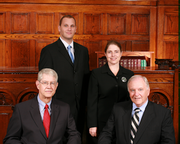4 FAQ About 1031 Exchanges

A 1031 exchange refers to a transaction where you exchange an investment property for a similar property, with capital gains taxes being deferred. This is a complex legal subject to navigate, and having an attorney to guide you through the qualifications and processes involved is necessary. Below are answers to some common questions about 1031 exchanges regarding policies and procedures to help you through the process.
What You Should Know About 1031 Exchanges
What is it?
A 1031 exchange is a swap of investment properties. Normally, the sale of an investment property would require you to pay a capital gains tax, which is a tax on the growth in value of an investment when you sell it. However, by swapping with a like-kind property, a 1031 exchange allows you to defer the payment of capital gains taxes. If your property qualifies for a 1031 and you follow all applicable IRS rules, you will have little, if any, taxes due at the time of the swap.
Does my property qualify?
 To qualify, the exchanged properties must be like-kind. This means that both properties in the swap must exist primarily for an investment or business purpose. For example, if your business and another local company want to swap office spaces, this would likely qualify for the exchange. A property held for personal use will generally not qualify for a 1031.
To qualify, the exchanged properties must be like-kind. This means that both properties in the swap must exist primarily for an investment or business purpose. For example, if your business and another local company want to swap office spaces, this would likely qualify for the exchange. A property held for personal use will generally not qualify for a 1031.
What are the deadlines?
There are 45- and 180-day deadlines in this transaction. First, you must identify potential like-kind replacement properties and notify a qualified intermediary by the 45th calendar day after the closing of the sale on the relinquished property. Second, you must complete the 1031 exchange transaction no later than 180 days after the closing of the sale; you must have the title of the other property by this date.
How can an attorney help?
The IRS requires a qualified intermediary to facilitate a 1031 exchange. An attorney can serve this role, handling the tasks central to the exchange of properties. They will prepare paperwork and oversee the transfer of the title. The IRS also stipulates that the property owner must not “touch” the money from the sale of a property. Instead, the money will go through the qualified intermediary, who releases the funds for the exchange.
When you need an attorney's services for a 1031 exchange, trust The Law Offices of Bromm, Lindahl, Freeman-Caddy & Lausterer. Since 1893, this Wahoo, NE, law office has been serving clients throughout the state. They represent clients in business and real estate law cases, estate planning, civil litigations, and other legal issues. Call (402) 443-3225 to schedule a consultation, or visit them online for more information about their services.
About the Business
(5 reviews)
Have a question? Ask the experts!
Send your question

